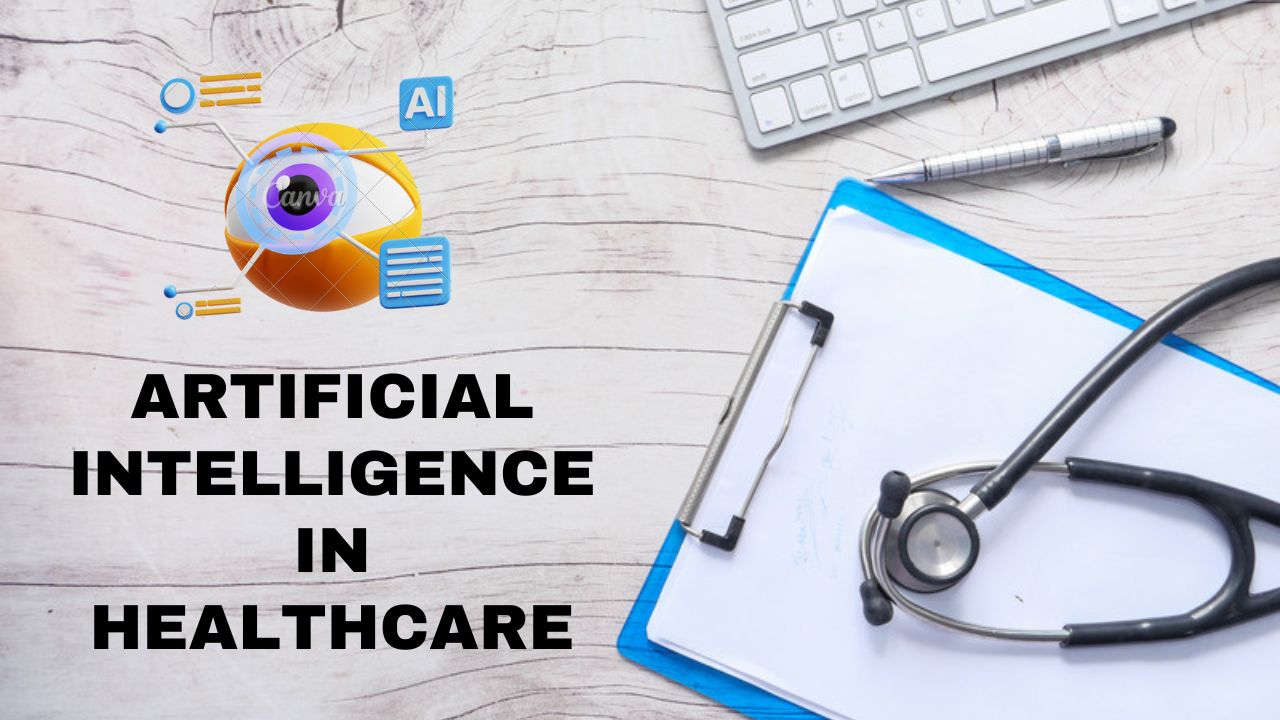Artificial Intelligence in Healthcare is an important topic we should know about because it is related to all of us.
In this article, we will talk about how Artificial Intelligence is going to change the healthcare industry forever. Even most of the Developed countries like the USA, the UK and Europe have included AI in their healthcare departments and it enhanced their quality of work.
The impact of AI in healthcare is a piece of good and bad news for us. There are a lot of benefits of AI in healthcare and also some of the drawbacks of it. we will learn about it but first, we have to understand AI in Healthcare
Understanding Artificial Intelligence in Healthcare
Let’s begin by unravelling the fundamentals. Artificial Intelligence, or AI, functions as a sophisticated assistant residing within machines. Mimicking human intelligence, AI can think, learn, and problem-solve, significantly enhancing various facets of healthcare delivery.
Spotting Trouble Early
Imagine possessing a friend with an extraordinary knack for finding anomalies. AI serves as an invaluable ally for healthcare providers, meticulously analyzing medical imaging such as X-rays, MRIs, and CT scans to detect subtle abnormalities that might elude human observation. This capability enables early detection of conditions like cancer, facilitating prompt intervention and augmenting the prospects of successful treatment.
Personalized Treatment Plans
AI empowers healthcare professionals to craft treatment strategies akin to bespoke garments. By assimilating vast troves of patient data encompassing genetic predispositions, lifestyle factors, and treatment responses, AI can recommend tailored treatment regimens tailored to individual needs. This personalized approach ensures optimized therapeutic outcomes, akin to a healthcare blueprint meticulously designed for each patient.
Streamlining Administrative Tasks
Even superheroes require assistance with administrative duties. Enter AI, the ultimate saviour in managing mundane tasks such as appointment scheduling and billing procedures. By automating these processes, AI liberates healthcare practitioners to allocate more time to direct patient care, streamlining operational efficiency and enhancing overall service delivery.
Benefits of AI in Healthcare
Now we will learn how AI operates the healthcare settings, let’s find out the benefits of AI in this industry.
Speedy and Accurate Diagnoses
AI epitomizes the epitome of speed and precision. Its capacity to swiftly analyze vast repositories of medical data translates into expedited diagnoses, facilitating prompt commencement of treatment modalities. This accelerated diagnostic process holds the potential to save lives by ensuring timely interventions and minimizing diagnostic uncertainties.
Saving Time and Money
Consider the countless hours expended by healthcare professionals on administrative tasks. AI interventions alleviate this burden by automating repetitive processes, fostering operational efficiency, and mitigating resource wastage. Consequently, streamlined workflows translate into cost savings, enabling healthcare institutions to allocate resources judiciously towards patient care and innovation endeavours.
Predictive Insights for Preventive Care
AI assumes the role of a proactive health sentinel, leveraging predictive analytics to anticipate potential health adversities before their onset. By scrutinizing vast datasets, AI can discern patterns indicative of impending health risks, enabling proactive interventions to avert adverse outcomes. This proactive stance towards preventive care embodies a paradigm shift in healthcare delivery, transitioning from reactive to preemptive healthcare models.
Challenges and Considerations
However, amidst its transformative potential, AI in healthcare confronts several challenges necessitating careful deliberation.
Safeguarding Patient Privacy
The sanctity of patient confidentiality stands paramount within healthcare ethos. AI algorithms must adhere to stringent data privacy regulations, such as the Health Insurance Portability and Accountability Act (HIPAA), to safeguard sensitive patient information from unauthorized access or misuse. Ensuring robust data encryption protocols and adherence to stringent privacy standards is imperative to engendering patient trust in AI-driven healthcare systems.
Interoperability and Integration
In the heterogeneous landscape of healthcare technology, interoperability emerges as a pivotal concern. AI systems must seamlessly integrate with existing healthcare infrastructure, fostering interoperability between disparate systems to facilitate cohesive information exchange. Harmonizing standards and protocols across diverse platforms is imperative to realizing the full potential of AI in healthcare delivery.
Mitigating Bias and Ensuring Equity
AI algorithms are susceptible to biases inherent in the datasets from which they derive insights. To mitigate bias and ensure equitable healthcare delivery, AI systems must undergo rigorous scrutiny to identify and rectify biases. Adopting transparent algorithmic methodologies and embracing diversity in dataset curation are pivotal steps towards fostering fairness and inclusivity in AI-driven healthcare interventions.
The Future of AI in American Healthcare
Looking ahead, the future of AI in American healthcare brims with transformative possibilities and groundbreaking innovations.
Accelerating Drug Discovery
AI catalyzes expediting drug discovery processes, revolutionizing pharmaceutical research endeavours. By leveraging machine learning algorithms to analyze vast molecular datasets, AI expedites the identification of novel drug candidates, hastening the translation of scientific insights into tangible therapeutic interventions. This accelerated drug discovery pipeline holds the promise of unlocking innovative treatment modalities for a diverse array of medical conditions.
Precision Surgical Interventions
Advancements in robotic-assisted surgical technologies empowered by AI herald a new era of precision surgical interventions. AI-driven surgical robots augment the capabilities of healthcare practitioners, facilitating minimally invasive procedures with unprecedented precision and dexterity. This convergence of AI and surgical robotics holds the potential to enhance patient outcomes, minimize surgical complications, and redefine the standard of care across various surgical disciplines.
Telemedicine and Remote Patient Monitoring
The paradigm shift towards telemedicine and remote patient monitoring catalyzed by AI innovations underscores the transformative potential of virtual healthcare delivery models. AI-enabled telemedicine platforms empower patients to access healthcare services remotely, facilitating seamless communication with healthcare providers and fostering continuous monitoring of health parameters. This evolution towards virtual healthcare delivery heralds a new era of patient-centric care, transcending geographical barriers and enhancing healthcare accessibility for diverse populations.
Artificial Intelligence represents a transformative force poised to reshape the landscape of American healthcare profoundly. While imbued with immense potential to enhance diagnostic accuracy, optimize treatment outcomes, and revolutionize healthcare delivery models, AI in healthcare also engenders nuanced challenges about data privacy, interoperability, and algorithmic bias. Through concerted efforts to address these challenges and harness the transformative potential of AI responsibly, we can navigate towards a future where technology synergizes with human ingenuity to foster a healthier and more equitable society.
This article aims to shed light on the multifaceted implications of AI in healthcare, encapsulating its unprecedented opportunities and inherent challenges within the intricate tapestry of American healthcare delivery. As we embark on this transformative journey, let us embrace the ethos of innovation tempered by ethical considerations, striving to harness the full potential of AI as a catalyst for positive change in healthcare delivery paradigms.



